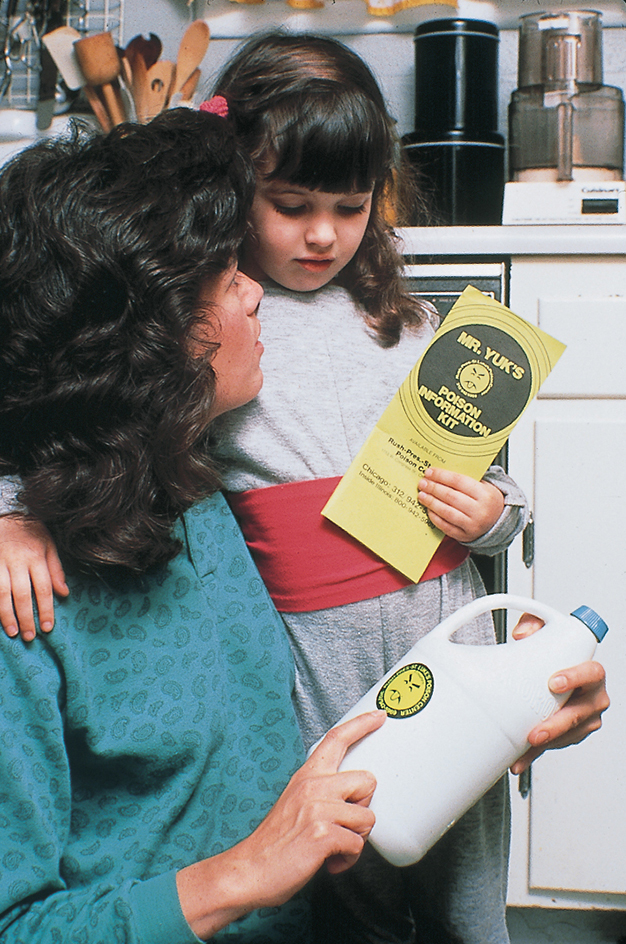Poison is a substance that causes injury or illness when introduced into the body. Poisons may be swallowed, inhaled, injected, or absorbed by the skin or body membranes. The study of poisons is called toxicology.

The most potent poisons are usually found only in laboratories. They cause few deaths because they seldom occur in everyday surroundings. Most deaths are caused by weaker poisons contained in common household products. Many poisonings take place when people fail to pay attention to labels and instructions on containers of chemical substances. Poisons found in farm and household products cause most poisonings and deaths in the United States. These products include insect sprays, rat poisons, cleaning and polishing compounds, and such fuels as gasoline. Even detergents have caused fatal poisonings when swallowed. A person also may be poisoned by improperly taking medications, by abusing such substances as alcohol, or by taking mind-altering drugs, such as cocaine and heroin.
To avoid poisonings, never eat untested foods, such as wild mushrooms or berries, or foods in unlabeled containers. Keep all medicines and chemicals out of the reach of small children. Children are more sensitive to poison than adults, and a smaller amount may cause a child’s death.
Poison control centers have been set up in many hospitals to give emergency information to doctors and the public. They furnish first-aid information and advise physicians and emergency personnel on the appropriate antidote. An antidote is a substance that relieves the harmful effects of poisons.
Poisons can be useful and even lifesaving. Useful medicines, such as curare and ouabain, were discovered because they were used first as poisons on arrows. Ouabain is similar to the drug digitalis (see Digitalis).
Fungi, plant, and animal poisoning.
Poisons produced by living organisms are called toxins. Some fungi produce toxins that are dangerous to human beings when swallowed in infested food. For example, some mushrooms have a toxic effect when they are eaten.
Many plants, such as larkspur and poison ivy, produce toxins that can be dangerous for human beings and livestock. Plant roots, stems, leaves, seeds, and fruits may contain poison.
Many animals have poisonous bites or stings. These include bees, wasps, scorpions, snakes, spiders, octopuses, and snails. Most animals use their poison to defend themselves or to hunt prey. Some fish, such as stingrays, have poisonous spines. Some salamanders and frogs, including toads, have poison in their skin. For more information, see the World Book articles on Snakebite and each of the above animals.
Kinds of poisons.
Scientists classify poisons in many different ways. A common classification lists five kinds: (1) corrosive poisons, (2) irritant poisons, (3) systemic poisons, (4) poisonous gases, and (5) poisonous foods.
Corrosive poisons destroy living tissue that they touch. Hydrochloric acid, nitric acid, and sodium hydroxide (lye) are corrosive poisons. A person who swallows this type of poison may destroy the tissues in his or her mouth and throat.
Irritant poisons cause inflammation (swelling and soreness) of the mucous membranes. These membranes line many air passages of the body, such as the nose. Irritants also affect the stomach, intestines, and nerve centers. Arsenic, lead, and most of the metallic poisons are irritant poisons. Arsenic causes vomiting and may affect the heart, kidneys, and other organs.
Systemic poisons attack the nervous system and other important organs, such as the kidneys, liver, and heart. Strychnine, a common rat poison, causes convulsions and difficulty in swallowing. Hydrocyanic acid and overdoses of heroin and cocaine may cause death. Poison from the belladonna plant produces hot flashes, thirst, and delirium (disorder of the mind). Many sedatives, such as barbiturates, are systemic poisons when taken in large doses. In addition, bites from some snakes, insects, and spiders can cause systemic poisoning.
Poisonous gases make breathing difficult and can cause death. Some poisonous gases, such as carbon monoxide from automobiles and gas heaters, are especially dangerous because they are difficult to notice at first. A number of poisonous gases irritate the lungs, eyes, nose, or skin.
Food poisoning can come from eating certain chemicals or organisms and their toxins. Chemicals, such as insecticides, and plants and animals, such as hemlock and certain shellfish, can cause food poisoning.
Botulism, poisoning caused by a toxin produced by bacteria, can cause paralysis and death.
